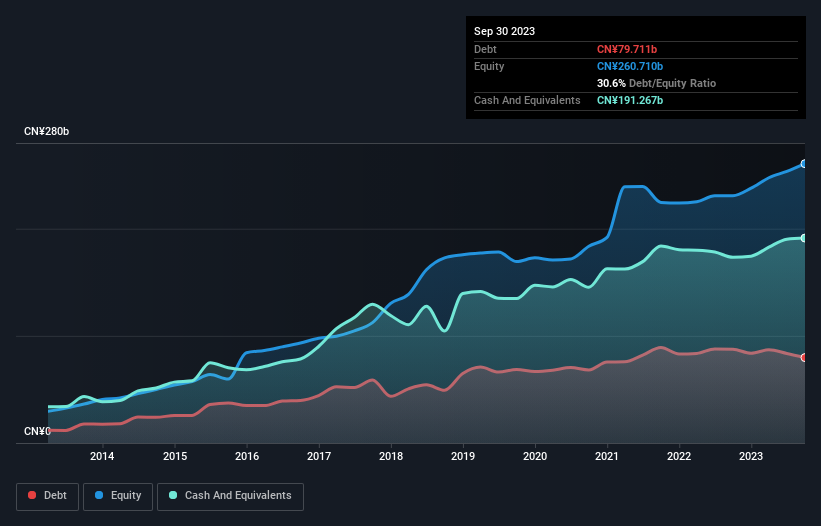- United States
- /
- Interactive Media and Services
- /
- NasdaqGS:BIDU
Is Baidu (NASDAQ:BIDU) A Risky Investment?

Legendary fund manager Li Lu (who Charlie Munger backed) once said, 'The biggest investment risk is not the volatility of prices, but whether you will suffer a permanent loss of capital.' When we think about how risky a company is, we always like to look at its use of debt, since debt overload can lead to ruin. We can see that Baidu, Inc. (NASDAQ:BIDU) does use debt in its business. But is this debt a concern to shareholders?
When Is Debt A Problem?
Debt is a tool to help businesses grow, but if a business is incapable of paying off its lenders, then it exists at their mercy. Ultimately, if the company can't fulfill its legal obligations to repay debt, shareholders could walk away with nothing. However, a more common (but still painful) scenario is that it has to raise new equity capital at a low price, thus permanently diluting shareholders. Of course, debt can be an important tool in businesses, particularly capital heavy businesses. When we think about a company's use of debt, we first look at cash and debt together.
See our latest analysis for Baidu
What Is Baidu's Net Debt?
As you can see below, Baidu had CN¥79.7b of debt at September 2023, down from CN¥87.5b a year prior. But it also has CN¥191.3b in cash to offset that, meaning it has CN¥111.6b net cash.

A Look At Baidu's Liabilities
Zooming in on the latest balance sheet data, we can see that Baidu had liabilities of CN¥81.6b due within 12 months and liabilities of CN¥68.7b due beyond that. Offsetting this, it had CN¥191.3b in cash and CN¥15.7b in receivables that were due within 12 months. So it can boast CN¥56.6b more liquid assets than total liabilities.
This surplus suggests that Baidu is using debt in a way that is appears to be both safe and conservative. Because it has plenty of assets, it is unlikely to have trouble with its lenders. Succinctly put, Baidu boasts net cash, so it's fair to say it does not have a heavy debt load!
In addition to that, we're happy to report that Baidu has boosted its EBIT by 62%, thus reducing the spectre of future debt repayments. The balance sheet is clearly the area to focus on when you are analysing debt. But it is future earnings, more than anything, that will determine Baidu's ability to maintain a healthy balance sheet going forward. So if you're focused on the future you can check out this free report showing analyst profit forecasts.
Finally, while the tax-man may adore accounting profits, lenders only accept cold hard cash. Baidu may have net cash on the balance sheet, but it is still interesting to look at how well the business converts its earnings before interest and tax (EBIT) to free cash flow, because that will influence both its need for, and its capacity to manage debt. Happily for any shareholders, Baidu actually produced more free cash flow than EBIT over the last three years. That sort of strong cash generation warms our hearts like a puppy in a bumblebee suit.
Summing Up
While we empathize with investors who find debt concerning, you should keep in mind that Baidu has net cash of CN¥111.6b, as well as more liquid assets than liabilities. And it impressed us with free cash flow of CN¥24b, being 100% of its EBIT. The bottom line is that we do not find Baidu's debt levels at all concerning. Over time, share prices tend to follow earnings per share, so if you're interested in Baidu, you may well want to click here to check an interactive graph of its earnings per share history.
When all is said and done, sometimes its easier to focus on companies that don't even need debt. Readers can access a list of growth stocks with zero net debt 100% free, right now.
Valuation is complex, but we're here to simplify it.
Discover if Baidu might be undervalued or overvalued with our detailed analysis, featuring fair value estimates, potential risks, dividends, insider trades, and its financial condition.
Access Free AnalysisHave feedback on this article? Concerned about the content? Get in touch with us directly. Alternatively, email editorial-team (at) simplywallst.com.
This article by Simply Wall St is general in nature. We provide commentary based on historical data and analyst forecasts only using an unbiased methodology and our articles are not intended to be financial advice. It does not constitute a recommendation to buy or sell any stock, and does not take account of your objectives, or your financial situation. We aim to bring you long-term focused analysis driven by fundamental data. Note that our analysis may not factor in the latest price-sensitive company announcements or qualitative material. Simply Wall St has no position in any stocks mentioned.
About NasdaqGS:BIDU
Baidu
Provides online marketing and non-marketing value added services through an internet platform in the People’s Republic of China.
Undervalued with solid track record.
Similar Companies
Market Insights
Community Narratives



